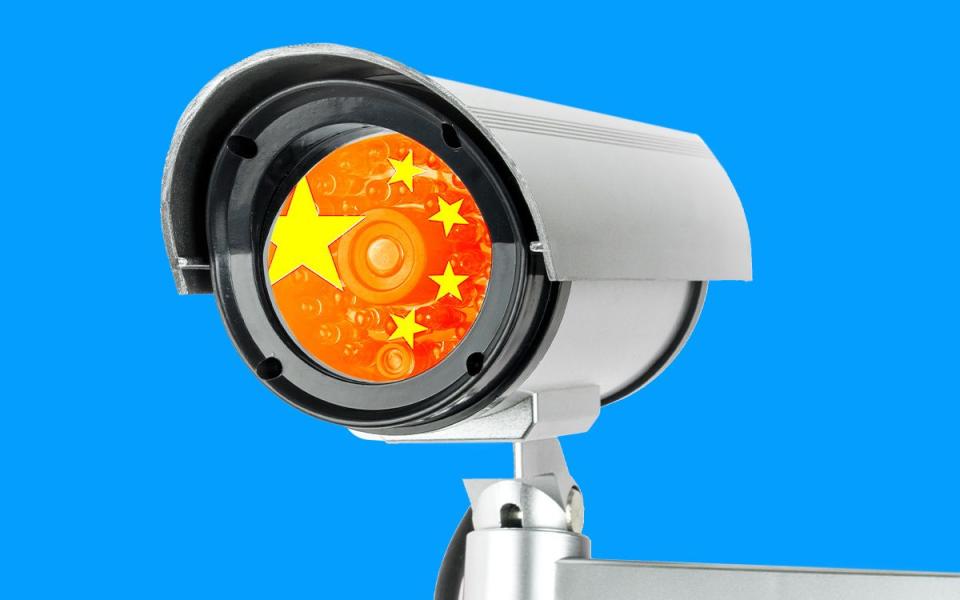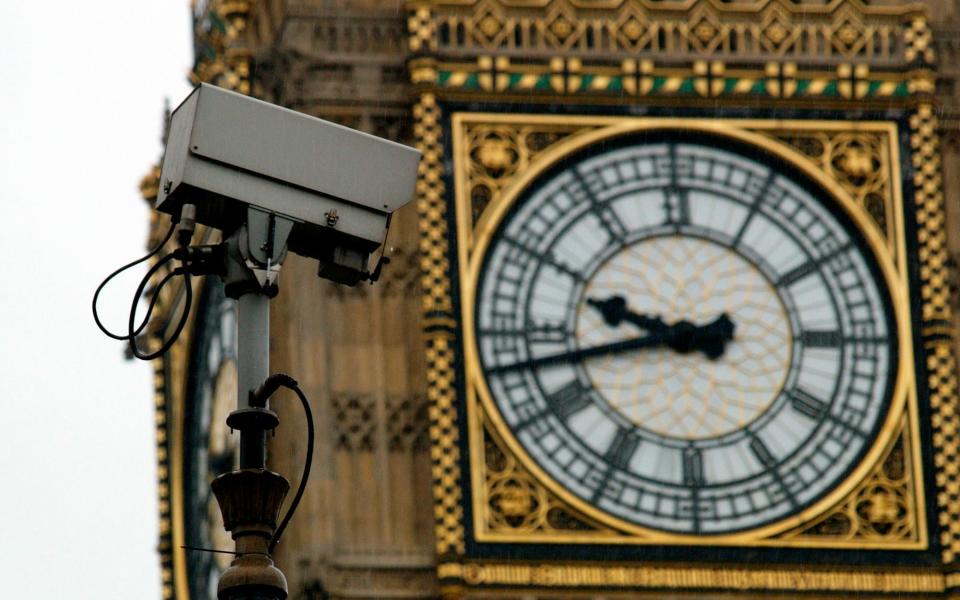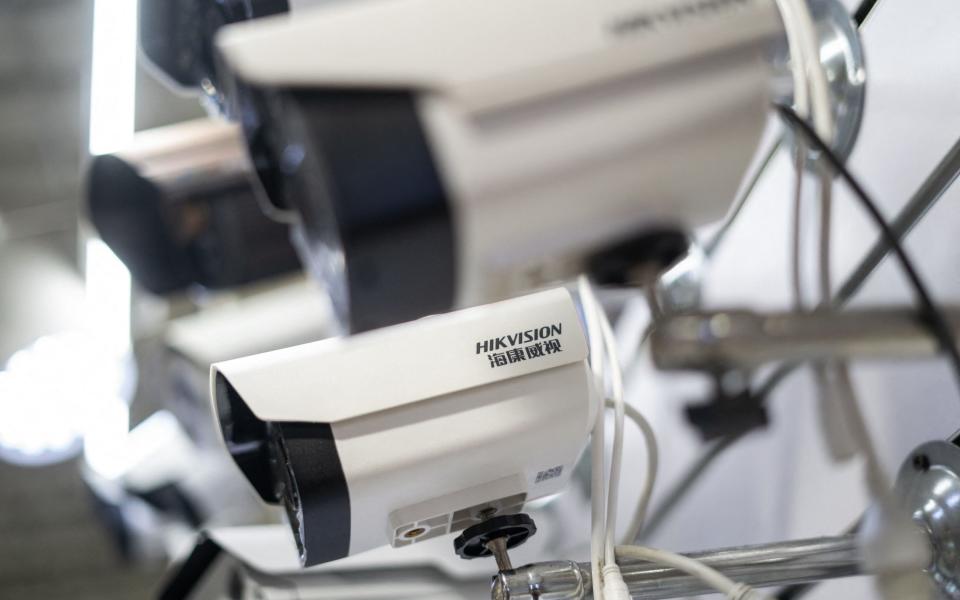How Beijing’s surveillance cameras crept into Britain’s corridors of power

In the confines of his small cell, Ovalbek Turdakun was watched 24/7. At any attempt to speak to others he was instantly told to be quiet, while lights in the room were on round the clock, making it impossible to know what time of day it was.
Turdakun and his fellow detainees in the Xinjiang camp were not watched by guards, but by software. Cameras made by the Chinese company Hikvision monitored his every move, according to an account he gave to US surveillance website IPVM.
Turdakun had never heard of the company, but recognised the logo after being evacuated to the US last month.
In 2017, Hangzhou-based Hikvision entered into five “partnerships” with authorities in Xinjiang, northwest China, worth a combined 1.9bn yuan (£224m) to last until 2040. They include surveilling mosques and camps in territory where Beijing has been accused of years of human rights abuses against the Uyghur population, using mass facial recognition and drones.
More than a million of the same company’s cameras are in Britain’s schools, hospitals and police departments. Tesco, Costa Coffee and McDonald’s have purchased Hikvision cameras. They are present in a string of Government buildings.
Britain’s population is caught on CCTV more than any nation outside of China, with 6m cameras in use – one for every 11 people. Hikvision is the biggest provider of them.
Campaign group Big Brother Watch estimates that 2,800 public bodies, around 60pc of the total, use cameras made by Hikvision or its smaller Chinese rival Dahua. This may be an underestimate, since many of the companies’ cameras are sold by resellers under different brands.
Hikvision’s staff numbers in the UK have increased from 70 in 2018 to 128 at the end of last year, with a research and development hub in London. Sales rose particularly strongly in 2020, when companies bought heat detection cameras to monitor Covid symptoms.
Globally, its revenues have risen to £9.5bn annually. Since Hikvision was founded in 2001, it has grown by undercutting competition with more affordable cameras, helped by billions in Chinese government loans with 41pc of the company owned by state-backed entities. Its cameras contain software such as facial recognition and “violence detection”.
Conor Healy, IPVM’s government director, says: “They haven’t really innovated products, it’s not what they're known for. They’re really just known for having the best price points.
“A lot of people in the market felt they were being undercut by a competitor that they couldn’t compete with. And one of the big reasons they can compete so well on cost is that they receive substantial subsidies from the Chinese government.”
Uyghur revelations spark calls to remove cameras

Hikvision has grown in Britain despite a wave of condemnation in other countries. The US government stopped buying Hikvision equipment in 2018 and blacklisted the company in 2019 over its role in the suppression of Uyghurs, restricting its trade with American companies.
In 2020, Lithuania’s Defence Ministry warned that flaws in the cameras meant “a chance that cyber attacks… or malicious code insertion, will be carried out against the cameras”. The ethics council of Norway’s giant sovereign wealth fund said Hikvision was involved in ongoing human rights abuses, and urged the fund’s managers to sell their holdings.
Now, growing concerns about Chinese technology in Britain and new revelations about the treatment of Uyghurs inside militarised internment camps are leading to calls for Hikvision’s technology to be stripped out of Britain.
Last week, a cache of leaked files and photographs from inside the camps revealed snipers were handed “shoot on sight” instructions for escapees and prisoners were interned for reasons such as “travelling to sensitive countries”. Amanda Milling, the Government minister for Asia and the Middle East, called the revelations “truly shocking”.
Parts of Britain’s Government have already sought alternatives to Hikvision. The Ministry of Defence has advised departments involved in military work not to use its equipment, the Department of Work and Pensions said in response to a Freedom of Information request. Last month, The Telegraph revealed that Sajid Javid, the Health Secretary, had banned the purchase of new Hikvision cameras on ethical grounds.
Ministers are now under pressure to go further. Big Brother Watch has revealed that Hikvision or Dahua cameras are in use at six Government departments including the Home Office, Business, Energy and Industrial Strategy, and Department of Justice.
The group, alongside human rights campaigners, has written to ministers in charge of the departments urging them to remove the technology. “It is deeply concerning that technology which enables widespread human rights abuses in China is being purchased and installed in the heart of the UK Government,” they wrote.
Campaigners have called for the Government to amend procurement legislation to ban companies such as Hikvision from being awarded Government contracts. In a debate last week, crossbench peer Lord Alton warned “we simply cannot allow the tools of genocide to continue to be used so readily in our daily lives”.
“Mass surveillance systems have always been the handmaiden of fascism. The Government should come forward with a timetable to remove these cameras and technology from the public sector supply chain,” he said.
Questions over camera 'backdoor'

Hikvision has said it respects human rights and has not won any contracts in Xinjiang since 2017, but its ownership means it has not spoken out about the alleged abuses.
Concerns go further, however. Opponents have warned the company’s Chinese ownership presents a security risk, especially when placed in sensitive locations, even raising the prospect that Hikvision’s technology could involve a backdoor to Beijing.
Fraser Sampson, the surveillance commissioner, recently warned Hikvision’s cameras have “capabilities that can be switched on remotely in the future as and when they are needed, for example, the ability to pick up sound”.
Hikvision denies any backdoor, although an investigation by the Italian broadcaster RAI last year reported its cameras were relaying data back to China. Hikvision said in January it had ordered the consultancy firm FTI to conduct a cybersecurity audit of its products.
Security researchers have repeatedly found glitches in the cameras’ software, although these could easily be errors, rather than intentional.
“Even if we put aside the issue of Chinese state control, and geopolitics and all the things that come up with Hikvision, their cybersecurity record should be of great concern to any government that is using them,” says Healy.
Removing Hikvision from Britain, even from Whitehall, would be a costly endeavour - but it would not be unprecedented. The Chinese telecoms company Huawei was central to the UK’s telecoms networks before ministers bowed to pressure to remove its technology in 2020. The delayed decision has cost telecoms companies billions as they are forced to rip out Huawei equipment already bought.
Lord Alton warned of a repeat scenario. “A negligent procurement policy means that we will ultimately end up stripping them out, as we did with Huawei,” he said, adding that this would come “at huge public cost”.
A Hikvision spokesman said: “Hikvision takes all reports regarding human rights very seriously and recognizes our responsibility for protecting people and property. The company has been engaging with governments globally to clarify misunderstandings about the company, our business, and address their concerns.
“Most people in the security industry are aware that central government departments do not connect their systems to the internet. Their system is closed, which prevents any such security risk claims.
“All tenders by government departments, which adhere to a strict procurement process, will be with installer contractors with no involvement from Hikvision or other CCTV manufacturers – including the monitoring of cameras.
“Local authorities and enterprises manage their own data via secure network systems which are not manufactured or managed by Hikvision.”

 Yahoo Finance
Yahoo Finance 